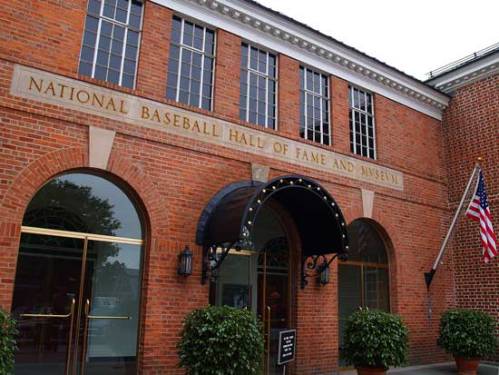Thursday, January 19, 2017

Baseball’s Hall of Fame votes were announced yesterday, and is often the case, the ethical issues raised were as interesting as the choices. The Baseball Writers Association Of America chooses who is to be enshrined; successful candidates must be on 75% of all ballots submitted, and have ten years of edibility after the initial 5 year waiting period expires.
Here were the vote totals of the players receiving significant support; the years each player has been on the ballot is the last number.
Jeff Bagwell 381 (86.2%) (7)
Tim Raines 380 (86.0%) (10)
Ivan Rodriguez 336 (76.0%) (1)
Trevor Hoffman 327 (74.0%) (2)
Vladimir Guerrero 317 (71.7%) (1)
Edgar Martinez 259 (58.6%) (8)
Roger Clemens 239 (54.1%) (5)
Barry Bonds 238 (53.8%) (5)
Mike Mussina 229 (51.8%) (4)
Curt Schilling 199 (45.0%) (5)
Manny Ramirez 105 (23.8%) (1)
Bagwell, Raines and Rodriguez were elected. Hoffman, the all-time leader in relief pitcher saves, just missed, and will almost certainly get into the Hall next year.
Ethics Observations:
1. More than anything, it is discouraging to see Barry Bonds crossing the 50% threshold. Bonds cheated, took the integrity out of some of baseball’s most important records, has lied about it to this day, and corrupted the game. Of course he is disqualified by the character requirements for entrance to the Hall. Bond’s vote total rise is attributed to several factors, including the old, unethical rationalizations we have been reading in defense of Bonds since he was playing. The latest excuses include the influx of younger voters who never saw Bonds nor witnessed the grotesquely inflated mutant he turned himself into, more voters throwing up their hands in frustration over the problem of sifting through so many players whose PED use is rumored, likely, or insufficiently proven, and voters who find the Hall’s recent election of former commissioner Bud Selig hypocritical, since he contrived ignorance to allow Bonds and others break the rules as long as possible. None of those excuses and rationalizations justify a single vote for Bonds.
2. Ivan Rodriquez‘s election also probably helped Bonds. He was one of the greatest catchers of all time, quite possibly the greatest defensive catcher, but in Jose Canseco’s first baseball and steroid tell-all book, “Juiced,” the steroidal slugger wrote of personally injecting I-Rod with the stuff while they were Texas Rangers. The catcher never tested positive in a drug test, but Canseco’s accusation was credible, especially after Rodriquez magically gained about 25 pound of muscle and started hitting home runs. Unlike Bonds, however, the evidence against him was slim. Jose, for example, is one of the great slime-balls in sports history. He may not be a liar, but since he admittedly wrote hisbook out of spite, he might be.
3. Ivan, in turn, was helped by the election of Jeff Bagwell. No player ever pinned steroid use on him, but Bagwell was judged a steroid-user by many because he became so muscular after starting out as a normally-built third baseman. Bagwell lifted weighs like a fiend, and clearly had a Hall of Fame level career, so keeping him out purely on suspicion seemed unfair, and was. His election slipped down the slope to boost Rodriquez, though, which in turn allowed some writers to rationalize voting for Bonds (and Roger Clemens, not as clearly guilty as Bonds, more seriously implicated than Rodriguez).
4. Bagwell also provides a lesson in moral luck. In 1990, with an injured closer and desperate to win a tight division race, the Boston Red Sox traded Jeff Bagwell, then the Double A third baseman behind Wade Boggs and AAA thirdsacker Scott Cooper on the team depth chart, for Houston reliever Larry Anderson. Anderson helped get the Red Sox to the play-offs, but when Boggs left as a free agent a year later and Bagwell became a star, Boston sportswriters vilified GM Lou Gorman for making the “terrible” trade. Classic consequentialism: Gorman couldn’t control what Bagwell did after he was traded; he just as easily might have been a bust. The trade worked just as it was supposed to, but once again, they are cursing the memory of poor Lou Gorman in Boston.
5. Tim Raines, elected on his last try, saw his enshrinement unfairly delayed by the sabermetrics fanatics. He was seen as the poor man’s Rickey Henderson when he played, but Raines had by far the best success percentage of any major base-stealer in MLB history. Hall of Fame baseball players in their prime prompt you to think, “WHOA! Who was THAT guy?” when you see them play for the first time. That was Raines. Numbers often don’t capture the essence of greatness, yet that is where fame comes from.
6. It is generally conceded that Curt Schilling,with ample Hall of Fame credentials, saw his votes fall off because of his outspoken conservative views. Curt knows it, his are self-inflicted wounds, but how disgraceful for the writers, and what an indictment of their lack of integrity and professionalism, to base their votes on politic rather than baseball.